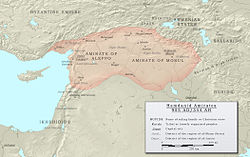Hamdanid Dynasty
| Hamdanid Dynasty | ||||||||||||||||||
| الحمدانيون Hamdaniyun |
||||||||||||||||||
|
||||||||||||||||||
|
Hamdanids in 955 during the rule of Sayf ad-Dawla.
|
||||||||||||||||||
| Capital | Aleppo (944-1002) | |||||||||||||||||
| Languages | ||||||||||||||||||
| Religion |
Shia Islam (including Alawiya) |
|||||||||||||||||
| Government | Hereditary monarchy | |||||||||||||||||
| Historical era | Middle Ages | |||||||||||||||||
| • | Established | 895 | ||||||||||||||||
| • | Husayn ibn Hamdan establishes himself as leader of Al-Jazira for the Abbasids. | 895 | ||||||||||||||||
| • | Sayf al-Dawla establishes himself in Aleppo after successfully countering the Ikhshidids of Egypt. | 944 | ||||||||||||||||
| • | Disestablished | 1002 | ||||||||||||||||
|
||||||||||||||||||
| Today part of | ||||||||||||||||||
The Hamdanid dynasty (Arabic: حمدانيون Ḥamdānyūn) was a Shi'aMuslim Arab dynasty of northern Iraq (al-Jazirah) and Syria (890-1004). They descended from the ancient Banu Taghlib Christian tribe of Mesopotamia and Eastern Arabia. The Hamdanid dynasty was founded by Hamdan ibn Hamdun (after whom it is named), when he was appointed governor of Mardin in SE Anatolia by the Abbasid Caliphs in 890.
His son Abdallah (904-929) was in turn appointed governor of Mosul in northern Iraq (906) and even governed Baghdad (914). His sons were installed as governors in Mosul and Aleppo.
The rule of Hassan Nasir al-Dawla (929-968), governor of Mosul and Diyar Bakr, was sufficiently tyrannical to cause him to be deposed by his own family.
His lineage still ruled in Mosul, a heavy defeat by the Buyids in 979 notwithstanding, until 990. After this, their area of control in northern Iraq was divided between the Uqaylids and the Marwanids.
Ali Sayf al-Dawla 'Sword of the State' ruled (945-967) Northern Syria from Aleppo, and became the most important opponent of the Christian Byzantine Empire's re-expansion. His court was a centre of culture, thanks to its nurturing of Arabic literature, but it lost this status after the Byzantine conquest of Aleppo.
...
Wikipedia

